#solar inverter for home
Text
Solar Panels | GoGetSolar | Australia
Go Get Solar is an expert Australian solar company committed to providing you with the largest range of solar panels, battery and inverters. More info gogetsolar.com.au
#solar inverter for home#solar panel battery#best inverter for home#solar panals#solar system#solar energy system#best inverter for home with price#how to clean rooftop solar panels#commercial solar panels#solar energy system for home#commercial solar panels melbourne#renewable energy#solar panels price victoria#residential rooftop solar
3 notes
·
View notes
Text

Waaree Energies continues to lead the charge towards a sustainable future. With a relentless focus on innovation and technological advancement, Waaree Energies introduces its latest breakthrough: lithium-ion batteries. These advanced energy storage solutions are set to revolutionize the way we harness and utilize renewable energy sources.
0 notes
Text
6 Points to Check Before Choosing a Solar Inverter

Introduction
Solar inverters are an essential component of any solar system. They convert the direct current (DC) electricity generated by solar panels into alternating current (AC) electricity that can be used to power your home. Choosing the right solar inverter is crucial to ensure that your solar system operates efficiently and effectively. In this comprehensive guide, we will explore the factors you need to consider when choosing a solar inverter for your home.
Efficiency and Power Output
Efficiency and power output are critical factors to consider when choosing a solar inverter. Efficiency refers to the percentage of DC electricity that is converted into usable AC electricity. The higher the efficiency, the more electricity your solar system will generate. Power output refers to the maximum amount of AC electricity that the inverter can produce. It is essential to choose an inverter with a power output that matches the capacity of your solar panels.
Several factors can affect the efficiency and power output of a solar inverter, including temperature, shading, and the quality of the solar panels. When choosing a solar inverter, consider your energy needs and the capacity of your solar panels to determine the appropriate efficiency and power output.
Compatibility
Compatibility is another crucial factor to consider when choosing a solar inverter. The inverter must be compatible with your solar panels and other equipment, such as a solar battery or charge controller. Choosing an incompatible inverter can result in reduced efficiency and performance.
Factors that can affect compatibility include the voltage and current of the solar panels, the type of battery used, and the type of charge controller. When selecting a solar inverter, ensure that it is compatible with your solar panels and other equipment to ensure optimal performance.
Warranty and Support
Warranty and support are essential considerations when choosing a solar inverter. A good warranty can provide peace of mind and protect your investment in case of defects or malfunctions. Additionally, reliable customer support can help you troubleshoot any issues that may arise.
When evaluating warranty and support options, consider the length of the warranty, the coverage provided, and the reputation of the manufacturer. Choose a solar inverter with a warranty that meets your needs and reliable customer support.
Type of Solar Inverter
There are three main types of solar inverters: string inverters, microinverters, and power optimizers. String inverters are the most common type and are suitable for most residential solar systems. Microinverters are installed on each solar panel and can improve efficiency and performance. Power optimizers are installed between the solar panels and the inverter and can optimize the performance of the solar system.
When choosing a solar inverter, consider the pros and cons of each type and choose the one that best meets your needs. Know more about solar inverter types and pricing details.
Brand and Reputation
Brand and reputation are essential considerations when choosing a solar inverter. Choose a reputable brand with a proven track record of quality and reliability. Research the manufacturer's reputation, read reviews, and ask for recommendations from friends and family.
Cost
Cost is an important consideration when choosing a solar inverter. Inverters can range in price from a few hundred dollars to several thousand dollars. Factors that can affect the cost of a solar inverter include efficiency, power output, and brand.
When choosing a solar inverter, consider your budget and the features you need to ensure optimal performance.
Let us learn How Gamma Plus solar inverter can be a best inverter for your home
Conclusion Choosing the right solar inverter is crucial to ensure that your solar system operates efficiently and effectively. Consider factors such as efficiency and power output, compatibility, warranty and support, type of solar inverter, brand and reputation, and cost when making your decision. By making an informed decision, you can ensure that your solar system provides reliable and cost-effective energy for years to come.
0 notes
Text
A Comprehensive Guide: How to Choose the Best Solar Inverter for Your Home
In the world of renewable energy, solar power stands as a beacon of sustainability and efficiency. As homeowners increasingly turn to solar energy to power their homes, selecting the right components becomes paramount. Among these components, the solar inverter plays a crucial role in converting the sun’s energy into usable electricity. Choosing the best solar inverter for your home requires careful consideration of various factors to ensure optimal performance and longevity. Here’s a comprehensive guide to help you make an informed decision.

Understand the Types of Solar Inverters
Solar inverters come in different types, each catering to specific needs and budgets. The primary types include:
String Inverters: Ideal for residential installations, string inverters connect multiple solar panels in series.
Microinverters: These inverters are installed behind each solar panel, allowing for individual optimization and monitoring.
Hybrid (Battery) Inverters: Designed to work with battery storage systems, hybrid inverters enable energy storage and backup power during outages.
Know about Your Energy Needs
Determine your average energy consumption and peak usage times. This information will help you choose a Solar panel for your Home that can handle your energy demands efficiently. Additionally, consider any future expansions or changes in energy usage that may affect your requirements.
Evaluate Efficiency and Performance
Look for inverters with high-efficiency ratings to maximize energy production from your solar panels. Efficiency directly impacts your system’s overall performance and energy savings over time. Opt for inverters with low degradation rates to ensure consistent performance throughout their lifespan.
Consider Monitoring and Connectivity
Opt for inverters that offer advanced monitoring capabilities. Real-time monitoring allows you to track your system’s performance, detect issues promptly, and optimize energy production. Additionally, choose inverters with Wi-Fi or cellular connectivity for seamless data access and system management via mobile apps or online platforms.
Ensure Compatibility and Warranty
Select a solar inverter for your home that is compatible with your solar panels and other system components. Check for compatibility regarding voltage, power rating, and communication protocols to avoid compatibility issues. Moreover, prioritize inverters with comprehensive warranties to safeguard your investment and ensure reliable operation for years to come.
Assess Installation Requirements
Consider the installation requirements and constraints of your property. Determine whether your system requires a rooftop or ground-mounted installation and assess any space limitations. Additionally, consult with a professional installer to ensure proper sizing, mounting, and wiring of the inverter for optimal performance and safety.
Evaluate Cost and Return on Investment
While cost is an important factor, prioritize value over upfront savings. Consider the long-term benefits, energy savings, and return on investment (ROI) when comparing inverters. Factor in maintenance costs, warranties, and potential energy production losses to determine the most cost-effective option for your home.
Seek Professional Advice
Consulting with solar energy experts or reputable installers can provide valuable insights and recommendations tailored to your specific needs. They can assess your home’s energy profile, recommend suitable inverter options, and ensure proper installation and integration with solar PV systems for your home.
In conclusion, choosing the best solar inverter for your home requires careful consideration of various factors, including efficiency, performance, compatibility, and cost. By understanding your energy needs, evaluating different inverter types, and seeking expert advice, you can select a high-quality inverter that maximizes energy production, enhances system reliability, and delivers long-term savings. Make an informed decision to harness the full potential of solar energy and transition towards a sustainable future.
0 notes
Text
This Summer install the Best Solar Inverter for Your Home
Are you planning to purchase an inverter for your home to ensure an uninterrupted power supply this summer? You are right, as nowadays power cuts have become a big problem in some areas despite all the necessary power supply actions taken by the government of India. As you all are aware of raising environmental issues, you should consider purchasing a solar inverter for your home use. Yes! It has many advantages along with reducing carbon footprints. Continue reading to know more about the benefits of getting a solar inverter for home and selecting the right one !!
For getting the maximum benefits of the appliance, the first and foremost requirement is to select the right capacity of the appliance to handle the amount of power you would be required to generate from your solar panels. Always look for an efficient inverter, which possesses high conversion efficiency to ensure getting the most power out of your solar panels. One more thing is to ensure compatibility with your local electrical grid to ensure seamless integration and uninterrupted functioning.

Then always checkout and select the solar inverter that has monitoring and control features, like access through an app, it would help you to track your device and performance with ease. Proper selection and purchase from a trusted brand would ensure a lot of benefits in the long run. Initially, you may find it a bit costly but ultimately there will be a huge saving on your electricity bills and the level of comfort provided by it would make it a wonderful investment. Amaze India, would help you out with the selection of the one to suit you best under expert guidance. Always get it installed under the supervision of expert professionals to ensure that all the fittings are done properly and meet all safety standards.
Using solar energy, a renewable energy source is an excellent way to contribute to a cleaner environment. Harnessing solar energy would reduce using fossil fuels and related emissions increasing environmental pollution. Moreover, once installed it would provide you with uninterrupted energy for years to come without any further addition, and with a little maintenance. The batteries of a solar inverter can store energy for later use so that you can use it comfortably even in times of low sun exposure or at night or in bad weather conditions.
Wait no more and plan the installation of a solar inverter to fulfil the power requirements of your home. You should always purchase such power backup products from reliable and renowned manufacturers like Amaze India. The brand has been committed to providing the best solar inverter along with other power backup solutions for years. Bring home a solar inverter to suit your requirements and contribute towards making the Earth a better place to live on. It would also save a lot of electrical expenses in the future. Explore the website or contact the team for necessary advice and select the right product!! Visit now!!
0 notes
Text
Choosing a Solar Inverter
When choosing a solar inverter for sale it's important to look at a few key factors. The best solar inverters will be able to monitor your entire system, from panel status to power output data. The best ones will also be able to help you detect faults. You should also look for a reputable company that offers solar installation. Make sure to choose a company that is HIES accredited, which means they have been vetted.
Most solar inverters will have a display that will tell you whether or not they are working properly. Green lights indicate that the system is working correctly, while red lights indicate a problem. If the display does not give you a visual representation of what's wrong, consult the user manual. It will tell you what error codes indicate, as well as what to do.
Depending on the size of your solar system, you'll have a few different types of solar inverters. If you're building a large solar system, you'll want to consider a string inverter, which is a unit that uses a transformer to change incoming direct current to AC.
The best solar inverter for your home should be able to achieve peak efficiency. However, it's important to keep in mind that this is a best case scenario. In reality, inverters rarely reach peak efficiency. Instead, they may only achieve it for a few hours a day, and occasionally, they won't function at all. Therefore, it's important to buy a brand that has been in business for five or more years and offers extended warranties.
0 notes
Text


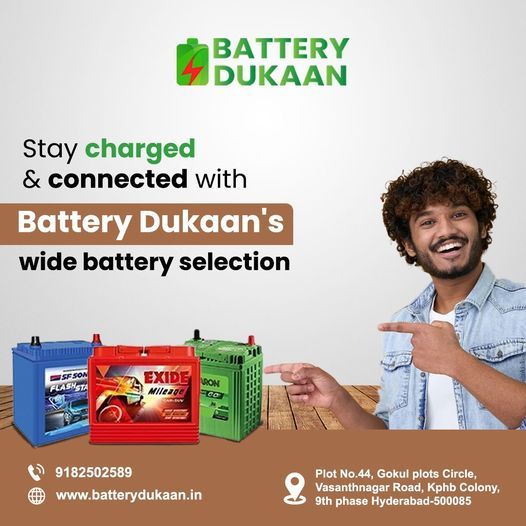







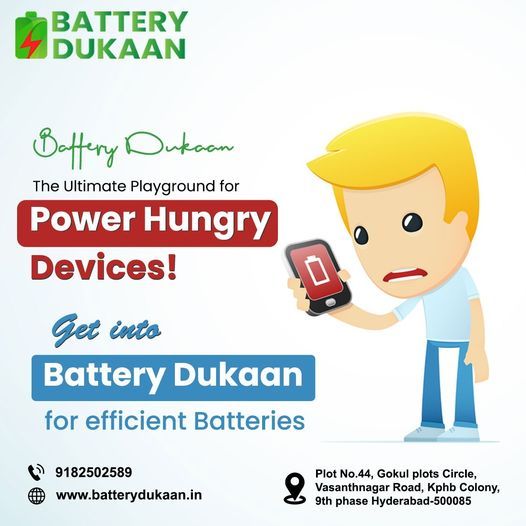

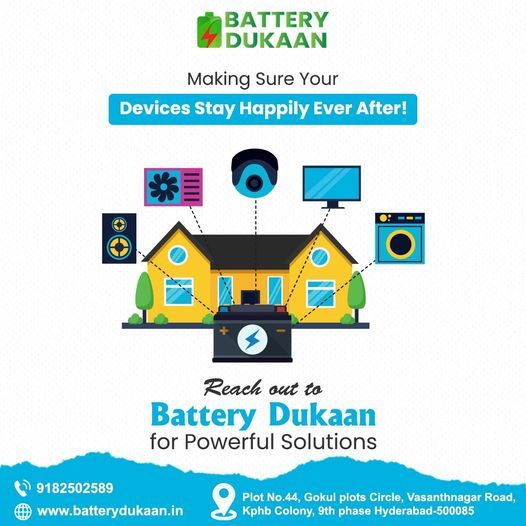


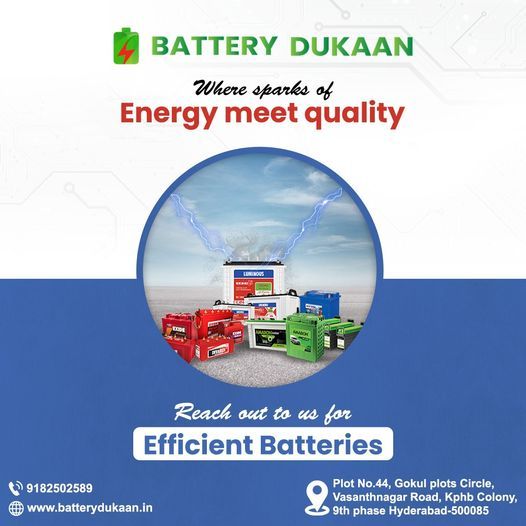
Buy Inverter Batteries Online at Best Price on Battery Dukaan. Get high-quality batteries for your inverters with easy ordering and fast delivery. Visits us now
#Exide Battery#Amaron Battery store#Best Battery Store near me#Inverter Batteries in Hyderabad#buy batteries online at baest price#Quality Batteries near me#top batteries for your home#solar batteries#Best Battery store online#Battery Dukaan#Battery Dukan
2 notes
·
View notes
Text

Reasons Why You Should Use a Home Power Inverter for Solar
A home solar inverter is an important element to have in your home as it plays a major role in a solar power system. Solar inverters work by acting as an intermediary where they change direct current (DC) electricity, which is produced by solar panels, to alternating current (AC) used in homes and other power systems. This makes it possible for solar energy to be used in a direct way by household devices and gadgets. A home power inverter for solar enhances the utility of power generated in a solar installation by ensuring the efficiency of the utilization of electricity. They also enable solar energy to be exported to the electrical grid and earn homeowners' credits by rolling back with the net metering programs. High-quality inverters provide the reliable efficiency needed for an effective return on a home solar power installation. Also, most of the nowadays’ common inverters incorporate monitoring, safety protection, and connection to the home energy management systems functionalities. Therefore, an inverter is strong and reliable enough to meet all the needs of a residential solar power system.
0 notes
Text
High-Quality Solar Off-Grid Inverter - Green Spectrum Solutions
Explore top-notch Solar Off-Grid Inverter at Green Spectrum Solutions. Our advanced inverters ensure reliable energy conversion, maximizing efficiency for your off-grid solar systems. Perfect for remote locations, our inverters provide dependable power solutions tailored to your specific needs.
0 notes
Text
Sunpower Nerang Inverters - Why Are They Important?

Sunpower Nerang is an intelligent way to reduce your energy bills and contribute to a cleaner environment. It’s also an affordable and reliable alternative to rising electricity prices.
An inverter converts DC solar power into alternating current for household use. Most residential solar systems use string inverters. They are cheap and easy to install. They are also easier to repair and maintain than microinverters. To know more about Solar Inverters, visit the Sun Solar Australia website or call 1800931992.
Inverters are a major part of any solar energy system. They convert DC power from solar panels into AC power that can be used in a home. They also perform other grid-management functions, such as adjusting their power output to match other supply and demand on the electricity grid. These features are important because they can help ensure that your solar panel system generates the most money in the long run.
A solar inverter’s cost depends on its type, size and efficiency. While it is tempting to buy the cheapest inverter, you should also consider its durability and quality. A good quality inverter may cost more upfront, but it will save you money in the long run.
The most common type of solar inverter is a string inverter. It connects a set of solar panels in a row to a single inverter, and transforms the power produced by all the panels into AC. This design is simple to install and wire and has fewer components that can break down. However, it can’t discern which panel is producing power, so if one panel is shaded or contaminated, the whole string produces less power.
Among other functions, solar inverters convert DC energy from your solar panels into AC power to be used in homes or fed back to the grid. In order to maximize your solar energy production, you need an inverter that is efficient.
Inverter efficiency is important for several reasons. First, it determines how long it will take for your system to pay back its initial investment through electricity savings. Second, it plays a critical role in the performance and reliability of your solar-plus-battery storage system.
It is also crucial to choose the right inverter size for your system. Oversizing an inverter can help prepare for future system expansions, while undersizing (within regulatory limits) allows for more efficient operation during low light conditions. However, it may risk power clipping during peak sun hours.
You should also check the inverter’s CEC or European efficiency rating. This information can be found on the manufacturer’s website or by using a free online tool like this one.
A quality solar power system is backed by a manufacturer warranty that lasts for up to 25 years. In addition, reputable installers offer warranties for the installation process and monitoring software. Depending on the type of system you choose, you may also get a warranty for the solar batteries and inverters.
Solar inverters are vital components of solar energy systems. They transform DC input from multiple solar panels into alternating current (AC) output for your home. They’re available in two different types: string inverters and microinverters. String inverters are a more economical choice and work best for solar arrays without battery storage. Microinverters are smaller and connect to each individual solar panel, transforming DC input into AC output at the source.
SolarEdge and Enphase offer warranties that last up to 25 years, but their terms differ a lot from one manufacturer to another. To make a claim, you must provide proof of purchase and a description of the issue.
A solar inverter converts DC power from your solar panels into AC current that can be used in your home. It also allows you to sell electricity back to the grid. Inverters are the heart of a solar energy system, and it is crucial to choose one that has a high-quality brand and good reputation.
Solar energy is a sustainable and renewable energy source that can save you money on your energy bills. In addition, a solar power system can improve your property’s resale value and reduce the amount of carbon you produce. It is also a great way to protect yourself from rising utility rates. To know more about Solar Inverters, visit the Sun Solar Australia website or call 1800931992.
Solar inverters require regular maintenance and cleaning to keep them working well. They should be kept away from flammable materials and gases, and should be in a ventilated space. This will ensure that the batteries do not short circuit and cause fire accidents. Additionally, it will help them maintain their maximum lifespan.
#hybrid solar system#hybrid solar system nerang#solar installation brisbane#residential solar panels#commercial solar#solar panel#solar installation#off grid solar nerang#solar energy system company#solar panel brisbane#Home Solar Electric System#solar inverters#solar energy system company Nerang#Solar Installation
0 notes
Text
Explore Solar Invertor For Home With Waaree

Waaree, a leading name in solar solutions, offers a variety of high-quality solar inverters suitable for residential applications. Their solar inverter for home are known for their efficiency, durability, and reliable performance. They can also guide you in choosing the most suitable inverter for your specific system needs. Don’t wait and buy solar panels for home now.
0 notes
Text
Gamma Plus Hybrid Solar Inverter V/S Delta Power 3.5KVA 24V Hybrid Solar PCU

As renewable energy sources are gaining attraction globally, Solar inverters stand as a frontrunner in the race towards sustainable energy solutions.
Gamma Plus r-MPPT solar inverter is a cost-effective and cutting-edge solution designed for maximum optimisation and utilisation of solar energy.
Its salient features:
Integrated with in-built r-MPPT (rapid maximum power point tracking) charge controller.
Provides you with double back-up from a single battery.
Comes with a LCD display screen to showcase the working condition of the inverter, whilst giving it a minimalist look.
It can also run through generator.
It is compatible with all types of batteries, no matter if its SMF, GEL, or a tubular battery.
It comes with 3 modes; PCU Mode (for cities), Hybrid Mode (for cities), and Smart Mode (for Towns).
Advantages:
It is well-equipped with r-MPPT charge controller, maximising solar panel output.
It comes with a user-friendly interface to display battery voltage, solar power consumption, etc.
It gives more importance to solar power usage over grid power to reduce grid consumption.
It assists bulk, absorption, and float charging stages for extended life of the battery.
Disadvantages:
Its limited capacity might not be sufficient in case of any larger installations.
Comparing:
Gamma Plus Solar Inverter V/S Delta Power 3.5KVA 24V Hybrid Solar PCU
When considering solar inverters for residential or commercial purposes, comparing features, performance, and suitability for specific needs is paramount. Let's compare the Gamma Plus Solar Inverter with the Delta Power 3.5KVA 24V Hybrid Solar PCU:
The Gamma Plus Solar inverter utilises advanced r-MPPT technology for extracting maximum solar power from the solar panels, thereby improving efficiency and effectiveness. On the other hand, the Delta Power 3.5KVA Hybrid Solar PCU integrates both solar and grid power sources.
The Gamma Plus inverter is compatible with various types of batteries and charging configurations which offer the users a great flexibility in selecting the battery and charging profiles to experience optimised performance and battery longevity. On the other hand, the Delta power hybrid solar inverter is designed to work with 24V battery systems.
The Gamma plus solar inverter provides users an option to track energy production, monitor system performance, and diagnose issues from the LCD screen that is present on the inverter. This screen also gives this inverter an aesthetic look. On the other hand, Delta Power likely offers monitoring and control functionalities through its PCU interface, allowing users to manage energy sources, monitor battery status, and adjust system settings as needed.
Both the Gamma Plus Solar Inverter and the Delta Power 3.5KVA 24V Hybrid Solar PCU offer competitive features and performance for solar power applications. The choice between these inverters would depend on specific requirements of the installers. There are certain things that you need to consider such as compatibility with existing systems, budget considerations, and the need for certain features like monitoring capabilities or battery management before making the most informed and cost-effective decision. Customers should evaluate their needs and requirements carefully and consider factors such as brand reputation, product reliability, and after-sales support while making the best investment in solar inverters.
0 notes
Text
How To Install Solar Inverter For Home In India
A solar inverter is a critical component of a solar energy system, responsible for converting the direct current (DC) electricity generated by solar panels into alternating current (AC) electricity that can be used to power electrical appliances and devices in homes, businesses, and other buildings. The inverter’s role is crucial in ensuring the efficient and reliable operation of the solar energy system, as it regulates the voltage, frequency, and overall quality of the electricity output. In addition to converting DC to AC, many modern solar inverters also incorporate features such as maximum power point tracking (MPPT) to optimize energy production, data monitoring capabilities to track system performance, and grid-tie functionality to enable the seamless integration of solar energy with the existing electrical grid. As solar energy continues to gain popularity as a clean and renewable energy source, solar inverters play an increasingly vital role in facilitating the widespread adoption and effective utilization of solar power.
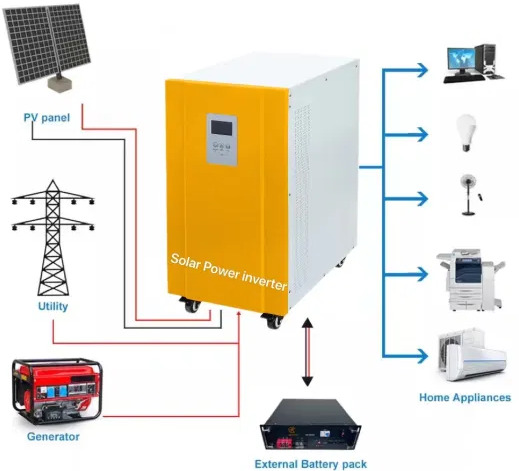
What are the benefits of solar inverter?
Solar inverters offer several benefits in the context of solar energy systems:
Efficient Energy Conversion: Solar inverters efficiently convert the direct current (DC) electricity generated by solar panels into alternating current (AC) electricity, which is compatible with the electrical grid and can be used to power appliances and devices in homes and businesses.
Optimized Energy Production: Many modern solar inverters incorporate maximum power point tracking (MPPT) technology, which continuously adjusts the operating voltage and current of the solar panels to maximize energy production under varying environmental conditions. This optimization helps to extract the maximum amount of energy from the solar panels, improving overall system efficiency.
Grid-Tie Functionality: Grid-tie inverters enable the seamless integration of solar energy with the existing electrical grid. They allow excess electricity generated by the solar panels to be exported to the grid, reducing reliance on grid-supplied electricity and potentially earning credits or compensation from the utility company through net metering programs.
Data Monitoring and Remote Control: Many solar inverters have data monitoring capabilities that allow users to track system performance, energy production, and electricity consumption in real-time. Some inverters also offer remote monitoring and control features, allowing users to adjust settings and troubleshoot issues remotely via a computer or smartphone app.
Reliability and Durability: Solar inverters are designed to withstand outdoor conditions and operate reliably for many years. High-quality inverters are typically backed by warranties and undergo rigorous testing to ensure long-term performance and durability.
Safety Features: Solar inverters incorporate safety features such as ground fault protection, overvoltage protection, and temperature monitoring to prevent electrical hazards and ensure the safe operation of the solar energy system.
Scalability: Solar inverters are available in various sizes and configurations to accommodate different system sizes and applications. They can be easily scaled up or expanded to meet changing energy needs, making them flexible and adaptable to evolving requirements.
What are the types of solar inverters?
Solar inverters come in several types, each designed for specific applications and system configurations. The main types of solar inverters include:
String Inverters: String inverters are the most common type of solar inverters used in residential and commercial solar energy systems. They are typically installed in a central location and connected to multiple solar panels arranged in strings. String inverters convert the DC electricity generated by the solar panels into AC electricity and are known for their simplicity, reliability, and cost-effectiveness.
Microinverters: Microinverters are small inverters installed directly behind each solar panel in a solar energy system. Unlike string inverters, which handle the conversion of DC to AC electricity for multiple panels, microinverters operate independently, converting the DC electricity from each panel into AC electricity. Microinverters offer advantages such as individual panel-level monitoring, improved shading tolerance, and increased system efficiency.
Power Optimizers: Power optimizers are devices installed at the back of each solar panel in a solar energy system, similar to microinverters. However, instead of converting DC to AC electricity, power optimizers optimize the DC electricity output from each panel before it is sent to a central string inverter for conversion to AC electricity. Power optimizers can improve energy production, mitigate shading issues, and enhance system performance, especially in installations with partial shading or uneven panel orientation.
Hybrid Inverters: Hybrid inverters, also known as battery inverters or multi-mode inverters, are designed for use in solar-plus-storage systems that incorporate battery storage. Hybrid inverters can manage both the DC electricity generated by solar panels and the DC electricity stored in batteries, converting it into AC electricity for use in the building or export to the grid. Hybrid inverters offer features such as backup power capabilities, grid independence, and energy management functionalities.
Grid-Tie Inverters: Grid-tie inverters, also known as grid-interactive or grid-connected inverters, are designed to integrate solar energy systems with the existing electrical grid seamlessly. They convert the DC electricity solar panels generate into AC electricity synchronized with the grid’s voltage and frequency. Grid-tie inverters allow excess electricity generated by the solar panels to be exported to the grid, reducing reliance on grid-supplied electricity and potentially earning credits or compensation through net metering programs.
What are the components of a solar inverter?
Solar inverters consist of several key components that work together to convert the direct current (DC) electricity generated by solar panels into alternating current (AC) electricity suitable for use in homes, businesses, and other electrical systems. The main components of a solar inverter include:
DC Input: Solar inverters are connected to the DC output of solar panels, which supply the direct current (DC) electricity generated by the photovoltaic (PV) cells.
Maximum Power Point Tracking (MPPT): Many solar inverters incorporate MPPT technology, which optimizes the performance of the solar energy system by continuously adjusting the operating voltage and current of the solar panels to maximize energy production under varying environmental conditions.
Conversion Stage: The conversion stage of the solar inverter consists of electronic components, such as transistors, capacitors, and transformers, that convert the DC electricity from the solar panels into AC electricity at the desired voltage and frequency.
Output Stage: The output stage of the solar inverter includes components such as filters and voltage regulators that ensure the quality and stability of the AC electricity output. This stage may also include features such as grid synchronization and anti-islanding protection to ensure the safe and reliable operation of the solar energy system.
Cooling System: Solar inverters may be equipped with a cooling system, such as fans or heat sinks, to dissipate heat generated during operation and maintain optimal operating temperatures. This helps to ensure the efficiency and longevity of the inverter components.
Monitoring and Control: Many modern solar inverters are equipped with monitoring and control features that allow users to track system performance, monitor energy production, and adjust settings remotely. This solar inverter for home features may be accessible through a built-in display panel, a web-based interface, or a smartphone app.
Protection Circuitry: Solar inverters incorporate protection circuitry, such as overcurrent protection, overvoltage protection, and ground fault protection, to prevent damage to the inverter and ensure the safety of the solar energy system and connected electrical devices.
Conclusion — solar inverters play a crucial role in the efficient operation and integration of solar energy systems, converting the direct current (DC) electricity generated by solar panels into alternating current (AC) electricity suitable for use in homes, businesses, and electrical grids. With advancements in technology, solar inverters offer features such as maximum power point tracking (MPPT) for optimizing energy production, grid-tie functionality for seamless integration with the existing electrical grid, and monitoring and control capabilities for tracking system performance and adjusting settings remotely. These features, combined with robust protection circuitry and cooling systems, ensure the reliable and safe operation of solar energy systems, maximizing energy production and minimizing downtime.
0 notes
Link
Recently more solar energy systems are being installed everywhere, may it be a home, a residential housing society, hospital buildings, malls, etc. The reason is that solar energy is very efficient and is less expensive in the long run though you find it more while installing.
0 notes
Text
Choosing a Solar Inverter For Sale

When choosing a solar inverter for sale, it is important to consider the power rating. These power ratings are expressed in kilowatts or watts, and represent the amount of power the device is able to produce. The smallest consumer inverters are designed to mimic the power provided by wall sockets, and typically range from 150 to 3000 watts.
Another type of solar inverter is a battery inverter. These units convert battery power into 230V AC and feed the power back into the switchboard, which can then replace your current grid power. Larger systems require a central inverter, which looks like a big metal cabinet and is capable of handling up to 500 kW of power.
The basic features of a household solar inverter include the ability to track the voltage produced by a solar array. The most advanced inverters can also monitor the health of your solar system and provide a portal for your computer network. Lastly, some models are able to operate without grid support, making them ideal for solar-plus-battery storage systems.
A solar inverter is an essential part of your solar energy cultivation system. It syncs with your solar panels, batteries, and charge controller to convert direct current to alternating current. It also helps you detect any abnormal electrical currents caused by outages in the power grid.
0 notes